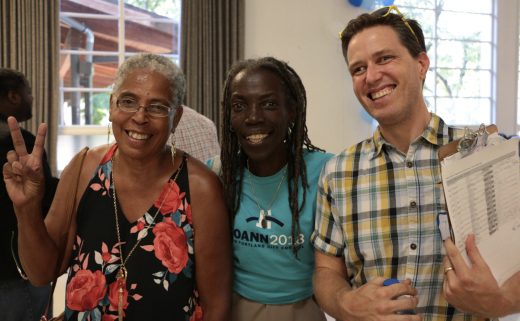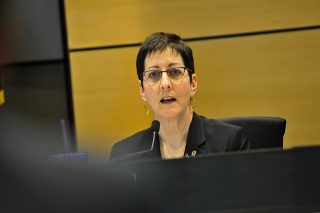
(Photo: Tony Jordan)
In the first national election since Donald Trump assumed the presidency — and despite gerrymandered districts, voter suppressions efforts, and racist campaigning by some Republicans — America tilted to the left last night. Here in the Portland region, the swing toward Democrats and progressive policies was even more pronounced.
In the race to replace longtime Portland City Commissioner Dan Saltzman, Jo Ann Hardesty cruised to an easy win over Loretta Smith. Hardesty becomes the first black woman to hold a council seat. Hardesty was endorsed by The Street Trust and nearly every transportation reformer in the BikePortland orbit was a major supporter.

(Photo: Jonathan Maus/BikePortland)
Women now have a 3-2 majority on Portland City Council, something Hardesty already seems to relish. OPB reported last night that during her victory speech she remarked, “We have big problems in this city but I am proud to be joining commissioner Amanda Fritz and Commissioner Chloe Eudaly. And I’m even going to be joining mayor … what’s his name? Ted Wheeler, and of course Commissioner Nick Fish.”
Portland voters also decided to pass the Measure 26-201, a.k.a. the Clean Energy Initiative. This innovative measure creates a new business licensing surcharge on large corporations to fund clean energy projects that will create jobs for nonprofits. Just as important as the policy is the coalition that came together to pass it. The steering committee included: the Asian Pacific American Network of Oregon, Coalition of Communities of Color, NAACP Portland Branch 1120, Native American Youth & Family Center, OPAL/Environmental Justice Oregon, Verde, 350PDX, Audubon Society of Portland, Columbia Riverkeeper, Oregon Physicians for Social Responsibility, and Sierra Club. This is the type of coalition will be a huge inspiration to transportation advocates as they organize for a major funding measure of their own in 2020.
Beyond Portland, former Metro Councilor Kathryn Harrington won her bid for Washington County Chair. She handily beat Bob Terry, who delivered an anti-Portland, borderline racist, and fear-mongering mailer in the week before the election that he was forced to apologize for. Harrington should be a bulwark against the typically car-centric transportation politics in Washington County. She was endorsed by The Street Trust.
Harrington will join veteran commissioner Dick Schouten and Pam Treece who won election to the commission in May. Schouten is a well-known advocate for bicycling and Treece says she’ll look to alleviate congestion “from a multimodal perspective.” That gives pro-biking, pro-transit three out of five votes.
Here’s what Sightline says about the new political picture in Washington County:
“… in the thriving technoburbs of Washington County, Ore., pro-transit Kathryn Harrington seems to have defeated pro-highway Bob Terry for county chair—enough for her, Pam Treece and Dick Schouten to form a rough three-to-two urbanist majority on the powerful board. Harrington, a three-term councilor in the regional Metro government, promises a strong contrast with the last eight years under Andy Duyck, the board’s outgoing, pro-sprawl chair. At Metro, Harrington has been one of the most reliable votes for reducing auto-dependent development patterns and improving non-car transportation options.”
Advertisement
Another big win for transportation in Washington County came in the race for Oregon House District 26 where Democrat Courtney Neron unseated incumbent Republican Richard Vial by a margin of 51 to 47 percent. Vial was considered a political moderate, but when it came to transportation policy he was dinosaur. Vial was a major proponent of building new mega-highways across farmlands in Washington County. In 2017 he pushed a failed bill that would have allowed cities and counties to form tolling districts to pay for highway projects. Vial’s bill was an attempt to fund his pet project, the “Northside Passage”. Vial was part of a worrying normalization of highway expansions and had a leadership position on several key House transportation committees (including one on carbon reduction). By contrast, Neron calls herself a “lifelong environmentalist” who thinks Oregon must, “aggressively address climate change.”
Overall, Oregon’s politics took a strong leftward swing. Governor Kate Brown easily won her race over Knute Buehler and Democrats now enjoy a supermajority in both the House and Senate. The Oregonian says this means, “Corporate tax hikes and progressive policy changes could be an easy sell in the 2019 session.” It’s also likely to have ramifications on transportation policy, even though that issue was heavily legislated in 2017. Would the $5.3 billion transportation package we passed in 2017 have been different if Democrats had a supermajority and didn’t have to give away highway projects and the silly new bike tax to get Republican votes for auto-related taxes and fee hikes? Probably. Other transportation-related topics often fall on party lines. Things like speed limits and distracted driving laws have been nearly party-line votes in the past. Safe street advocates should be very optimistic about their chances in 2019.
What were some of your takeaways from last night — transportation or otherwise?
Here’s a list of stories from some national transportation and urbanist sources we follow:
— On Ballot Measures, a Progressive Sweep – CityLab
— Cascadia Midterm Election Results – Sightline (co-authored by our former news editor Michael Andersen)
— Jonathan Maus: (503) 706-8804, @jonathan_maus on Twitter and jonathan@bikeportland.org
Never miss a story. Sign-up for the daily BP Headlines email.
BikePortland needs your support.


